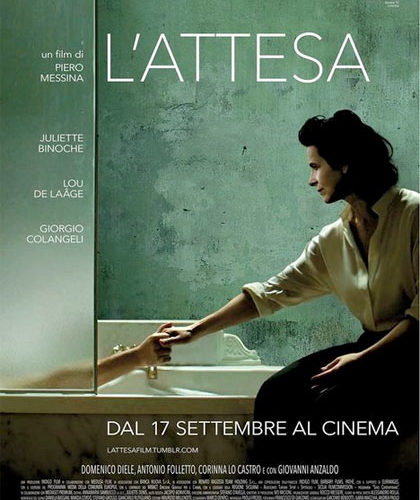Seeing that the film starts in the middle of a memorial service, it doesn’t qualify as a spoiler to reveal that the unseen hero of L’attesa (The Wait) – the subject of both female protagonists’ devotion – isn’t going to show up as claimed/expected. With this mystery gone, the story is firmly set around the dynamic shaped by an absence, an illusion, a lie. Which is a more-than-valid premise, for sure; except the screenplay, adapted from the Italian play La vita che ti diedi by a whopping four writers, can never quite expand on that wistful idea and comes up short at every turn.
We meet Anna (Juliette Binoche) first, a grief-stricken mother who needs to summon up a prayer and the last of her strength just to get out of bed after the unexplained passing of son Giuseppe. On one of those identical, insufferably quiet days that follow, she gets a call from Giuseppe’s Parisian girlfriend Jeanne (Lou de Laâge), whom he has invited to join them at their Sicilian family house. Knowing full well the girl’s mistake, Anna bids her over nonetheless and together they shall wait for a shared loved one who’s never going to return.

When considered in abstract terms, such vague, subliminally kinky plotlines promise fertile ground for intensive psychological explorations. There are plenty of interesting questions to ask: Why wouldn’t Anna tell Jeanne the truth? What does she seek to achieve by keeping the young girl in this wishful limbo? How much does Jeanne really know or pretend not to know as the wait drags on and she could easily find out about everything by herself? What’s going through the mind of caretaker Pietro and other guests at the wake who witness the absurd situation and become unwilling accomplice to deceit by not pointing out the obvious?
To be fair, first-time feature director Piero Messina does hint at deeper, more subtle motivations beyond a protective self-delusion or denial at certain moments. But such flashes of inspiration are fleeting and the majority of screen time is spent in flatly written two-woman talks by the lake, at the dinner table, in the Turkish bath, where they keep skirting around the real issue, the only issue, until all believability drains out and character development stalls. There’s the chance for the relationship to take a turn for the abusive and for the story to acquire a more ostensibly genre edge, but Messina never took that bait. It might have been an opportunity lost, though, for the film never gained the seductive force of something like 2003’s Swimming Pool despite a similar emphasis on female sensuality.

Visually there’s a lot to salivate over in this beautifully designed, almost compulsively artful picture. It’s not just the land, water, the vivid expanse of Sicily that provides a constantly stunning backdrop to the proceedings. Distinct color schemes and careful framing turn everything from a silent car ride to a frying egg into oeuvres of considerable sophistication. While Messina’s taste cannot be denied, this observation is not entirely complimentary, for there’s a calculated quality to all this exquisiteness – when you render even the X-ray images of an airport baggage scan so chicly commercial-ready, it can appear quite suspicious, not to mention exhausting to watch.
Binoche is as ever a master of her craft. How she commands the most minuscule aspect of her physicality, countenance, disposition to emote and affect betrays no technical blemish, creating a visage that’s full of fascinating clues even at its most immobile. It’s a shame, then, that the role of Anna is so direly underwritten and her domineering position in relation to Jeanne so firmly established, that there’s just not enough stuff for a solo home run, nor much of an acting duet at all. In the end, like a breath of stylized, impassioned hot air, L’attesa evokes feelings associated with bereavement effectively but has nothing substantial to add to the whole psychology of loss.
The Wait premiered at the Venice Film Festival and opens on April 29th.

